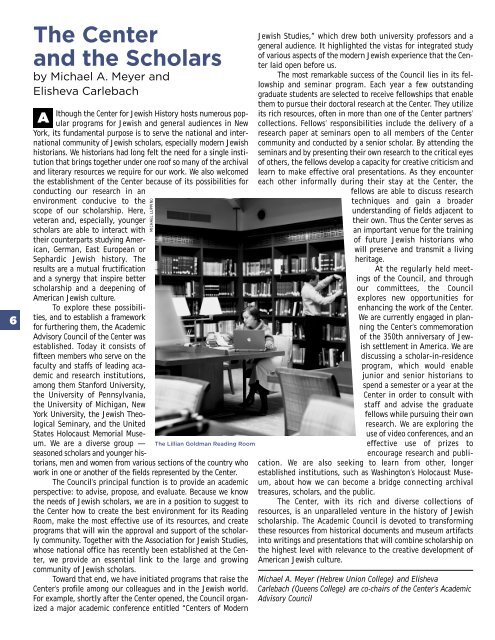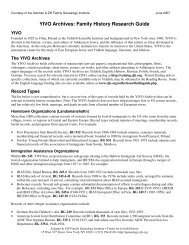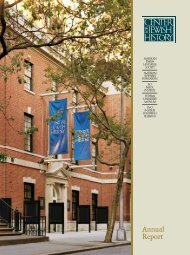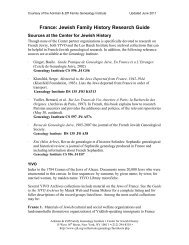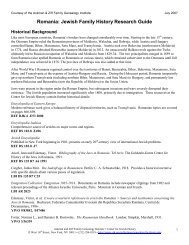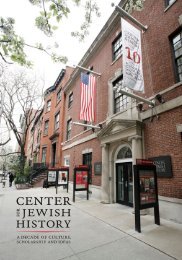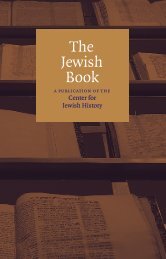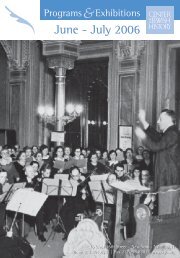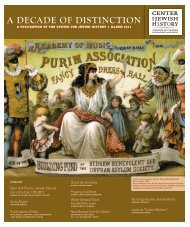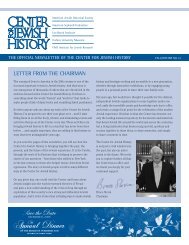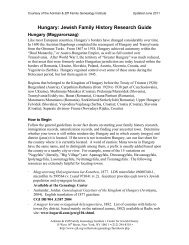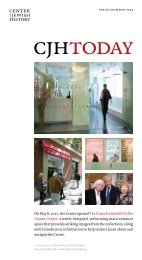ib singer ib singer ib singer ib singer ib singer - Center for Jewish ...
ib singer ib singer ib singer ib singer ib singer - Center for Jewish ...
ib singer ib singer ib singer ib singer ib singer - Center for Jewish ...
Create successful ePaper yourself
Turn your PDF publications into a flip-book with our unique Google optimized e-Paper software.
6<br />
The <strong>Center</strong><br />
and the Scholars<br />
by Michael A. Meyer and<br />
Elisheva Carlebach<br />
A<br />
lthough the <strong>Center</strong> <strong>for</strong> <strong>Jewish</strong> History hosts numerous popular<br />
programs <strong>for</strong> <strong>Jewish</strong> and general audiences in New<br />
York, its fundamental purpose is to serve the national and international<br />
community of <strong>Jewish</strong> scholars, especially modern <strong>Jewish</strong><br />
historians. We historians had long felt the need <strong>for</strong> a single institution<br />
that brings together under one roof so many of the archival<br />
and literary resources we require <strong>for</strong> our work. We also welcomed<br />
the establishment of the <strong>Center</strong> because of its poss<strong>ib</strong>ilities <strong>for</strong><br />
conducting our research in an<br />
environment conducive to the<br />
scope of our scholarship. Here,<br />
veteran and, especially, younger<br />
scholars are able to interact with<br />
their counterparts studying American,<br />
German, East European or<br />
Sephardic <strong>Jewish</strong> history. The<br />
results are a mutual fructification<br />
and a synergy that inspire better<br />
scholarship and a deepening of<br />
American <strong>Jewish</strong> culture.<br />
To explore these poss<strong>ib</strong>ilities,<br />
and to establish a framework<br />
<strong>for</strong> furthering them, the Academic<br />
Advisory Council of the <strong>Center</strong> was<br />
established. Today it consists of<br />
fifteen members who serve on the<br />
faculty and staffs of leading academic<br />
and research institutions,<br />
among them Stan<strong>for</strong>d University,<br />
the University of Pennsylvania,<br />
the University of Michigan, New<br />
York University, the <strong>Jewish</strong> Theological<br />
Seminary, and the United<br />
States Holocaust Memorial Museum.<br />
We are a diverse group —<br />
seasoned scholars and younger historians,<br />
men and women from various sections of the country who<br />
work in one or another of the fields represented by the <strong>Center</strong>.<br />
The Council’s principal function is to provide an academic<br />
perspective: to advise, propose, and evaluate. Because we know<br />
the needs of <strong>Jewish</strong> scholars, we are in a position to suggest to<br />
the <strong>Center</strong> how to create the best environment <strong>for</strong> its Reading<br />
Room, make the most effective use of its resources, and create<br />
programs that will win the approval and support of the scholarly<br />
community. Together with the Association <strong>for</strong> <strong>Jewish</strong> Studies,<br />
whose national office has recently been established at the <strong>Center</strong>,<br />
we provide an essential link to the large and growing<br />
community of <strong>Jewish</strong> scholars.<br />
Toward that end, we have initiated programs that raise the<br />
<strong>Center</strong>’s profile among our colleagues and in the <strong>Jewish</strong> world.<br />
For example, shortly after the <strong>Center</strong> opened, the Council organized<br />
a major academic conference entitled “<strong>Center</strong>s of Modern<br />
MICHAEL LUPPINO<br />
The Lillian Goldman Reading Room<br />
<strong>Jewish</strong> Studies,” which drew both university professors and a<br />
general audience. It highlighted the vistas <strong>for</strong> integrated study<br />
of various aspects of the modern <strong>Jewish</strong> experience that the <strong>Center</strong><br />
laid open be<strong>for</strong>e us.<br />
The most remarkable success of the Council lies in its fellowship<br />
and seminar program. Each year a few outstanding<br />
graduate students are selected to receive fellowships that enable<br />
them to pursue their doctoral research at the <strong>Center</strong>. They utilize<br />
its rich resources, often in more than one of the <strong>Center</strong> partners’<br />
collections. Fellows’ respons<strong>ib</strong>ilities include the delivery of a<br />
research paper at seminars open to all members of the <strong>Center</strong><br />
community and conducted by a senior scholar. By attending the<br />
seminars and by presenting their own research to the critical eyes<br />
of others, the fellows develop a capacity <strong>for</strong> creative criticism and<br />
learn to make effective oral presentations. As they encounter<br />
each other in<strong>for</strong>mally during their stay at the <strong>Center</strong>, the<br />
fellows are able to discuss research<br />
techniques and gain a broader<br />
understanding of fields adjacent to<br />
their own. Thus the <strong>Center</strong> serves as<br />
an important venue <strong>for</strong> the training<br />
of future <strong>Jewish</strong> historians who<br />
will preserve and transmit a living<br />
heritage.<br />
At the regularly held meetings<br />
of the Council, and through<br />
our committees, the Council<br />
explores new opportunities <strong>for</strong><br />
enhancing the work of the <strong>Center</strong>.<br />
We are currently engaged in planning<br />
the <strong>Center</strong>’s commemoration<br />
of the 350th anniversary of <strong>Jewish</strong><br />
settlement in America. We are<br />
discussing a scholar-in-residence<br />
program, which would enable<br />
junior and senior historians to<br />
spend a semester or a year at the<br />
<strong>Center</strong> in order to consult with<br />
staff and advise the graduate<br />
fellows while pursuing their own<br />
research. We are exploring the<br />
use of video conferences, and an<br />
effective use of prizes to<br />
encourage research and publication.<br />
We are also seeking to learn from other, longer<br />
established institutions, such as Washington’s Holocaust Museum,<br />
about how we can become a bridge connecting archival<br />
treasures, scholars, and the public.<br />
The <strong>Center</strong>, with its rich and diverse collections of<br />
resources, is an unparalleled venture in the history of <strong>Jewish</strong><br />
scholarship. The Academic Council is devoted to trans<strong>for</strong>ming<br />
these resources from historical documents and museum artifacts<br />
into writings and presentations that will combine scholarship on<br />
the highest level with relevance to the creative development of<br />
American <strong>Jewish</strong> culture.<br />
Michael A. Meyer (Hebrew Union College) and Elisheva<br />
Carlebach (Queens College) are co-chairs of the <strong>Center</strong>’s Academic<br />
Advisory Council


